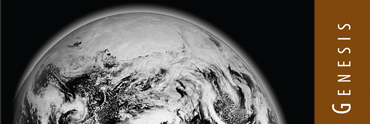Genesis released

Auxano Press is pleased to announce the newest in our non-disposable curriculum series. Here is a sample from chapter 1 of Genesis:

Genesis is not a make-believe story of the beginning of things but a factual history of the origin of everything. Ken Hemphill wrote, “‘In the beginning’ is not simply an introductory phrase like ‘once upon a time.’ It is a solemn affirmation that God created everything from nothing (ex nihilo).”1 The familiar opening verse of Genesis is not a guess or theory about how creation came to be; it is a statement of what truly was. As self-centered beings, the natural tendency is to focus on “we the creation” when studying Genesis 1 rather than “Thee the Creator.” However, the most important statement coming from the first chapter is not about creation but about the Creator.
God Is Eternal
The first verse is an affirmation of the eternal nature of God. God was there in the beginning, when in fact He was not only at the beginning, but He was present before the beginning even began. Awestruck by God’s eternal nature, the psalmist proclaimed, “Even from everlasting to everlasting, You are God” (90:2). In other words, if time travel were possible, no one could ever find a moment in eternity past or eternity future where God did not or will not exist. God always was, God always is, and God will always be. God’s existence is so essential, so infinite, and so incomprehensible that He is not even contained by the boundaries of time. Thinking about the eternal existence of God will cause anyone to shout, “Great is the Lord, and highly to be praised, and His greatness is unsearchable” (Ps. 145:3).
God Is Preexistent
The first verse also affirms the preexistent nature of God. Before everything existed, there was God. The psalmist declared, “The heavens are telling of the glory of God” (19:1); yet before creation existed to tell of God’s glory, the Creator gloriously existed. For the human mind the preexistence of God is an impossible thought to understand. Before mountains ascended, before valleys descended, and before plains extended, God existed. God predates the first speck of dust, the first drop of water, the first ray of light. Scientists have helped us know that ninety-two elements of matter exist naturally; yet not one of them existed before God. Some scientists have even wrongly theorized that all matter was birthed by a galactic big bang; yet even that theory doesn’t explain how the energy and matter that caused the big bang came into existence. According to the inaugural statement of the Bible, God existed before all energy and all matter. Energy cannot say to itself, “Be energized!” Matter cannot say to itself, “Be formed!” Only God is capable of saying and doing such a thing. And the most fascinating thought of all is that no one ever commanded God into existence because God has always existed as a completely independent Being.
God Is Independent
The first verse in Genesis also affirms God’s complete independence. God is the original Being from which all other beings receive their existence. No living creature can cause itself to exist, and no living creature can claim existence without proof of dependency on another living creature. Only God has the capacity to exist independently of anyone or anything.
Life begets life. A baby’s birth and existence depend on other humans who help create and nurture a child’s existence. A seed can only become a tree if a tree makes the seed and if the environment is suitable to nurture the seed’s growth. Charles Darwin’s theory of evolution is incomplete. Existence is not determined by evolution and a “survival of the fittest.” Existence is determined by God, who is the true Original and from whom all things find their origin. Where did life originate? In fact, where did everything originate? God is clearly the only suitable answer to the question of origin.
God Loves to Communicate
Divine communication also played an important role in the story of creation. According to Genesis 1, communication was God’s mode of creation. In other words, God decided to create by simply speaking all things into existence. God did not use a magical potion. God did not use the assistance of angels. God did not create by blinking His eyes. Having the ability to use any mode for creation, the first chapter in Genesis is clear that God created all things through speaking. God’s speaking or calling occurs sixteen times in the thirty-one verses of Genesis 1. God could have chosen to stay silent while creating, but He chose to speak. This is a tremendous thought! God desired to communicate from the beginning.
God created light by His word. His voice also created the sky, the land, the waters, the sun, the moon, the stars, the seasons, the length of a day, and the length of a night. Who determined how long a day should be and how long a year should be? God did. Who determined the geography of the world, where land should be and where water should be? God did. Who determined the location of the stars, the size of the moon, or the precise distance between the sun and the Earth, thereby making life possible on this planet? God did. God did. God did. And how did He go about doing all this? Simply by speaking.
God created vegetation in all forms, functions, and sizes. By His mouth God created the mouth of the lion and all land-going creatures, the beak of an eagle and all air-going creatures, and the teeth of the great white shark and all sea-going creatures. God’s word brought humanity into existence. The common ancestor of every person who has ever lived originates in the spoken word of God. The triune God spoke man into existence, a living creature that bears His image and likeness, has dominion over all other creatures on the Earth, and is blessed and commanded to be fruitful, multiply, and fill the earth (Gen. 1:26–28).
Humanity’s inception begins with the communication of God. We did not speak ourselves into existence. God spoke us into existence. Do not underestimate the role and importance of divine communication in the act of creation. God’s birthing us by His voice reveals why all humanity, no matter who you are or where you come from, desperately needs to hear from the Creator. We inherently have questions. We want to ask why and what for a trillion different reasons. Why do I exist? Why are things so? Why this event or that? What is the meaning? What is my purpose? We ask all these questions and so many more because our origin is found in the voice of God and we cannot have peace until we hear it again. By God’s voice we are born biologically and physically, and by God’s voice we are born spiritually. Praise be to God that our Creator is not silent! God not only creates by His voice, but He also sustains, calms, and satisfies by His voice.
God Has All Power and Authority
God’s speaking creation into existence reminds us that God’s word carries supreme power and authority. God is supremely powerful because no one but God can speak and create something out of nothing. God is supremely authoritative because when God commands something to happen, it happens. As we recognize our all-powerful God with completely authoritative words in the first chapter of the Bible, we can more easily recognize God’s power and the authority of His word in the other 1,188 chapters of the Bible. The kind of power and authority described in Genesis 1 is the same kind of power and authority that can be trusted in all of God’s Word. Do you believe God and His words have the power and authority to create all things? If you do believe, then do you see that the power and authority in God’s words to create the heavens and the earth is also the same power and authority that created the Old and New Testaments?
God Wants Us to Have Faith
Genesis 1 reveals a communicative, authoritative, and powerful God who is eternal, preexistent, and independent, but this chapter also declares much more about God. The issue of faith clearly surfaces in the first verse of the Bible. Only God was present at the origin of everything. No one can claim to be an eyewitness of the birth of the heavens and the earth. We don’t have a signed affidavit about the historical events of creation. We have only two options when it comes to the creation account in Genesis 1–2: belief or disbelief.
God, who divinely inspired every word in the Bible, intended His opening statement to be confrontational. God has no need to prove His existence to anyone. Speaking through the psalmist, God declared, “If I were hungry I would not tell you, for the world is Mine, and all it contains” (50:12). As God has no need to tell anyone if He were hungry, He also had no need to prove His existence. Every person, when confronted with the creation account of Genesis 1–2, has to decide by faith if God is Creator or if we created God.
Belief or disbelief is a matter of faith, no matter which side you choose. The difference for true Christian believers is their decision to trust God and His Word completely from Genesis to Revelation. If a person has difficulty believing God created the heavens and the earth, then that person will find it difficult to believe in God’s Word and His only plan of salvation. Some so-called Christians think they can pick and choose which parts of the Bible are true and believable. The problem with that approach to the Bible is still a matter of disbelief, choosing to believe more in one’s mental capacity to discern truth than to accept all of God’s Word by faith. Show me a person who believes in parts of the Bible, and I will show you a person who partly believes in God. In the case of Genesis 1–2, faith in the creation account does not mean we abandon all sense of critical thinking, but it does mean we trust in the God of the Bible who has said, “I, God, created everything.” It’s simple. Do you believe in God? Do you believe in the God of the Bible? If you do, then by faith you are declaring God as the origin of everything.
For Memory and Meditation
“In the beginning God created the heavens and the earth.” Genesis 1:1
______
1 Ken Hemphill, Old Testament Survey (Tigerville, SC: Auxano Press, 2012), 2.





